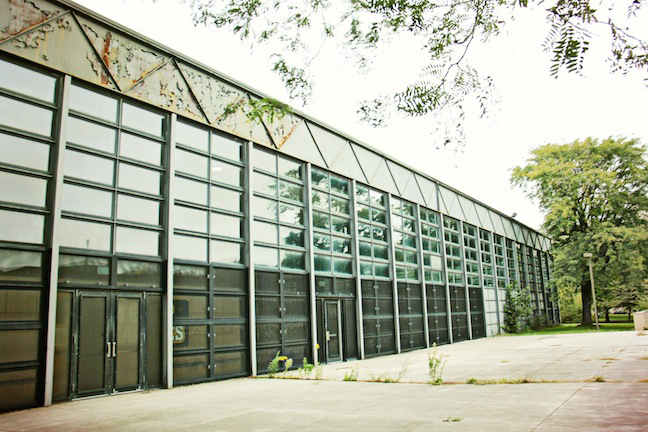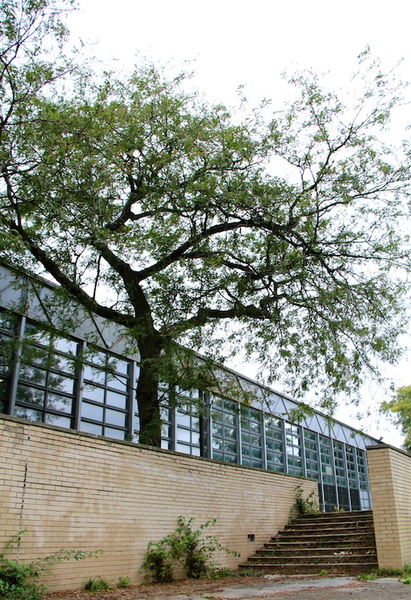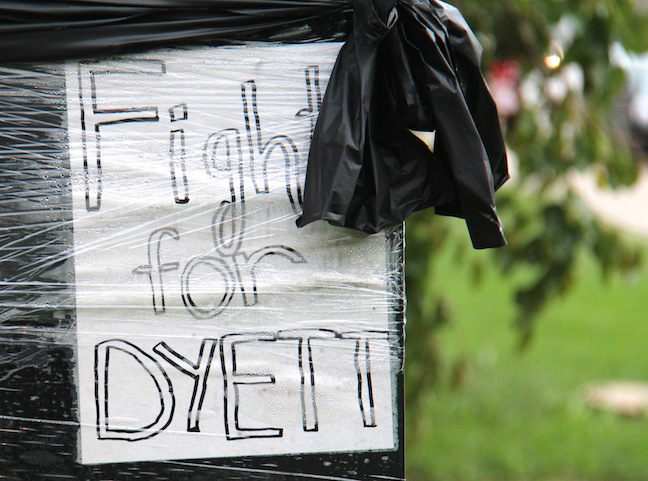Last Tuesday, dozens of people gathered outside the James R. Randolph Center to recognize the efforts of local activists’ thirty-four day hunger strike in protest of Chicago Public Schools’ handling of Dyett High School’s future. The rally also supported a resounding call to replace Chicago Public School’s appointed school board with an elected representative one.
Members of various education and community-based organizations like the Kenwood-Oakland Community Organization (KOCO) and Raise Your Hand stood with picket signs and friends on the corner of Clark and Randolph. Jitu Brown, an education organizer with KOCO and face of the Dyett movement, opened the rally with a chant.
“Education is a human right! What do we do?”
“Fight! Fight!”
This rally came ten days after the end of the thirty-four day hunger strike during which fifteen protestors drank only liquids and some required hospitalization. The hunger strike began on August 17 in response to CPS’s postponement of an announcement of its selected proposal for the school’s future.
“There were days when all you could do was just sit there and be balled up because you were so hungry,” Brown said of the experience. “It was bad!” Despite this, activists from the Coalition to Revitalize Dyett pressured city officials with public protest throughout the hunger strike—a September 2 budget meeting quickly turned into a Dyett protest, forcing a security team to escort Mayor Emanuel off stage as protestors confronted him face-to-face.
Walter H. Dyett High School, nestled in Washington Park’s north end on 51st Street, was slated to close after the class of 2015 graduated. The Board of Education voted to phase out the school in early 2012, citing poor performance and low enrollment. But in late 2014, after pressure from the community—led by Brown and KOCO activists—CPS announced Dyett would reopen for the 2016-2017 school year and solicited proposals for the school.
Three proposals were submitted: Kenwood-based Little Black Pearl Workshop proposed a plan for a visual and performing arts school, Dyett’s former principal Charles Campbell and the Washington Park Athletic Career Academy Design Team proposed a sports culture and athletic entrepreneurship school, and the Coalition to Revitalize Dyett proposed Walter H. Dyett Green Technology and Global Leadership High School, a plan developed over three and a half years and built in part on Dyett’s relationship with the Chicago Botanic Garden’s (CBG) Windy City Harvest Farm. Since 2013, students from the high school have been employed by CBG, learning about farming and food accessibility in Chicago.
All three proposals described an open-enrollment, neighborhood school, but Little Black Pearl would have run the school as a private operation with a contract with CPS, while the Coalition demanded a traditional CPS-operated school .
On September 3, day eighteen of the hunger strike, CPS announced that Dyett would reopen as a “new open enrollment, arts-focused neighborhood high school and community innovation lab,” in 2016. The school would not be run by Little Black Pearl.
Some saw this decision as a plea for hunger strikers to end their protest. Some considered it a victory because it resulted in a neighborhood, open enrollment school.
The establishment of Dyett as an open-enrollment, neighborhood school was a priority for the activists from the start of their organizing around the school, but the Coalition saw the decision—which selected none of the three proposals—as an example of CPS’ unwillingness to work with the community and continued the hunger strike.

While the new school will not have the green technology components that the Coalition and KOCO have fought for, it will feature an “Innovation Technology Lab” that the Illinois Institute of Technology will assist in developing, according to the CPS press release regarding the reopening. The Coalition continued to demand a curriculum focused on green technology, a seven-year plan to reach LEED platinum certification, and vigorous community involvement in the school.
The Coalition also took issue with the proposed arts focus of the school. “We are not opposed to a strong arts program in our school,” Brown said in an interview with Carol Marin on the Chicago Tonight show. “But we just want to see a school that prepares our young people to be the next scientists, the next civic leaders and the next doctors,”
The Coalition was also frustrated that CPS would not work with them despite their willingness to work with CPS. During the rally, Brown told the crowd that the Coalition always attempted to operate through bureaucratic channels before moving forward with protest tactics.
“This was not something we did to get attention,” Brown said. “We never start off in the street, we always start off at the table.”
4th Ward Alderman Will Burns—who has been an opponent of the coalition throughout the Dyett struggle—was quoted in a September 16 Hyde Park Herald article saying that KOCO’s demands are not shared by the majority of Bronzeville, and that “the overall community has voiced and asked for an arts-based school with open enrollment since at least 2012.” In the same article, he said that KOCO wanted their proposal to win “so they can provide work within the school.” He pointed to the parts of the Dyett Global Leadership and Green Technology Community High School proposal that say that KOCO would work with the school to provide “Student Leadership and Summit Institutes” and summer employment opportunities for the students.
Brown called the accusations that KOCO was motivated by the group’s own interests “slander.” Burns’ office did not respond by press time when asked to provide more explanation on the motivation for the comments.
“History, if written by them, will look at us a certain way. Rabble Rousers, money hungry, whatever they would say,” Brown said of the struggle to gain a voice. “But history written by people in our neighborhoods would look at people like [hunger striker] Irene Robinson as heroes.”
The Coalition to Revitalize Dyett continues to campaign for the curriculum, boundaries, and increased community involvement for the new school. Brown suggested that the tone of the hunger strike would inspire the group’s future actions.
“The hunger strike was protracted, [a] very clear message, and determined. And I think that’s what we need to do moving forward,” Brown said.

Decisions regarding Dyett’s fate are already finding their way to pen and paper. A new principal, Beulah McLoyd, was chosen on September 24.
On September 29, the CPS Board approved a resolution for Dyett’s boundaries to be placed at 41st to the north, Lake Michigan to the east, 60th to the south, and both King Drive and Cottage Grove to the west, an area smaller than the Coalition’s vision.
The Coalition’s plan had advocated for attendance boundaries where seventy-five percent of students would come from the Bronzeville neighborhood, twenty-percent from Greater Bronzeville (an area bounded by 41st to the north, 67th to the south, the Dan Ryan to the west, and Lake Shore Drive to the east), and an additional five percent citywide enrollment, numbers that ensure the school would reach capacity, according to Brown.
The same resolution also stated that Dyett will begin the year with a “transitional advisory body,” and that a Local School Council “will be established in a timely manner.” Jirebu Lee, education organizer for KOCO, had mentioned to the Weekly a concern that CPS might be “fighting back” against establishing a Local School Council for Dyett.
While the Coalition and KOCO remain committed to having a voice in Dyett’s rebirth, they are also moving forward to fight for the establishment of an elected representative school board (ERSB) for the City of Chicago’s public schools. The Coalition and KOCO’s choice to move forward with advocating for an ERSB is closely tied to their Dyett effort; it exhibits a hope that, if an elected school board is won, decisions about public schools in Chicago will finally be in the hands of the community.
Lee noted that while KOCO has campaigned for an ESRB for over ten years, this rally represents a larger effort to make public school in Chicago more democratic, with an ERSB as a clear, necessary step in that direction. Since 1995, Chicago has been the only district in the state of Illinois with an appointed school board.
“One ingredient for us to really be able to have democracy in our education, is to have an elected school board that’s actually accountable to the voters,” Lee said.
The bill, titled HB 4268, currently sits in the House of the Illinois General Assembly with fifty-five cosponsors. Part of KOCO’s efforts is to ensure the bill has a veto-proof total of seventy-one cosponsors before the vote. With those numbers, Governor Rauner loses veto powers, and the bill would move immediately to the Senate.
“We’re at a critical point in history, and we want to really make sure that everybody is clear so that we can be moving forward together, getting [the legislation] across the finish line.” Lee says. “So that never again do people have to go on a hunger strike. Never again do people have to take over city hall to get heard.”

